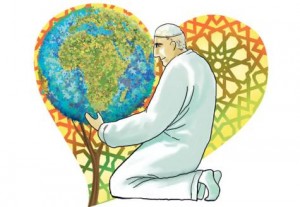
Environmental Ethics in the Quran
As University of Malaysia law professor Mohammad Hashim Kamali observes in his paper, “Environmental Care in Islam: An Qur’anic Perspective,” Islam’s regard for environmental ethics is apparent in the organization of its sacred scriptures. The titles of the Quran’s suras, or chapters, refer both to the attributes of God and an array of natural phenomena, including animals, plants, insects, mountains and weather. This holistic vision of man’s relation to God and the environment is likewise evident in multiple passages of the Quran, such as 18:7, which indicates that people will be accountable for how they treat all of the earth’s beauty. Accordingly, Kamali notes, the Quran teaches that people can act unjustly not only by mistreating others, but by wasting and abusing natural resources.
Unity and Sustainability
One foundational principle of Islamic environmental justice is unity, which is known in Muslim theology by the Arabic term, tawhid. As United Nations water and environmental expert Iyad Abumoghli explains in “Sustainable Development in Islam,” God expresses his oneness in the interconnected ecosystem of the earth and its inhabitants, and people must honor this divinely integrated order by acting in ways that are consistent with being part of greater whole. One key aspect of interconnectedness noted in the Quran is the link to subsequent generations. In teaching that people should use nature in such as way as not to exhaust or destroy the natural resources available for the future, Islam expresses what many believe to be the defining value of sustainable development.
The Environment in the Balance
A related principle of Islamic environmental ethics, Kamali notes, is the importance of maintaining balance. The Quran and the Hadith, which contains reports of the sayings of Muhammad, make repeated references to God’s endowing the universe with a natural equilibrium, which in turn means that Muslims are to act in ways that are equitable and maintain the divine order. For example, Kamali cites the innate clarity of water and air as a reason for curbing pollution. Similarly, environmental ethicist Ali Mohamed Al Damkhi applies the balance principle to equal treatment of the environment in both poor and rich communities. According to Al Damkhi, an oil company that promotes green practices in the United States while wantonly exploiting an impoverished region elsewhere would be acting in an unbalanced manner that it is inherently unjust.
Khalifa Allah — The Steward of God
Besides a general obligation to respect the principles of oneness and balance in God’s creation, Islam teaches that humanity has a special responsibility to care for the environment. As Muhammad says in the Hadith, “The world is sweet and green, and verily Allah has installed you as khalifa,” which is Arabic for steward, vicegerent or trustee. Humanity’s role as the earthly khalifa of God has a distinctly legal significance, inasmuch as nature has been given not as a possession, but to hold in trust on God’s behalf. A particular focus of the Muslim’s stewardship.
By John Green